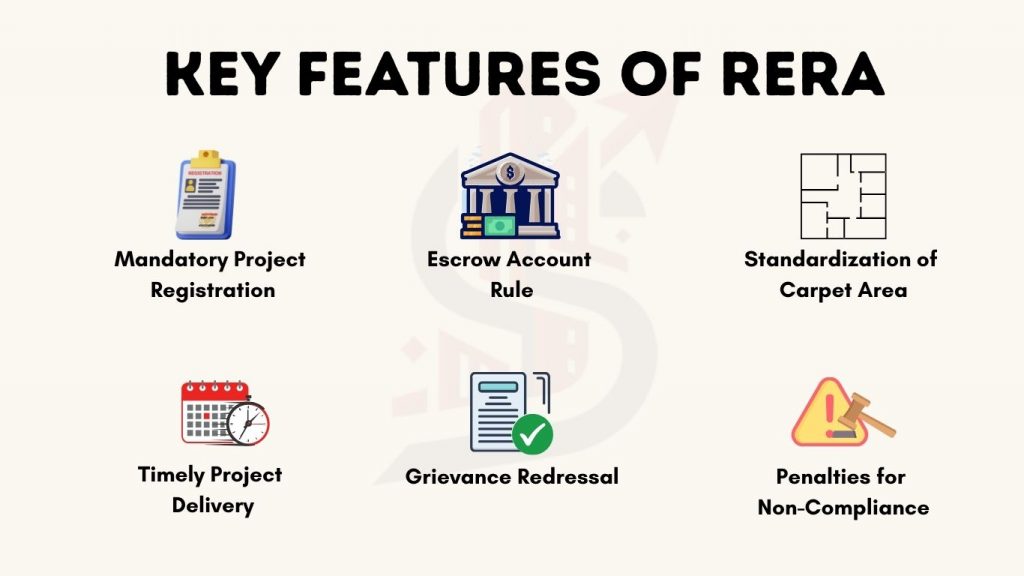The real estate market in India has long been a significant contributor to the country’s economy, ranking second only to agriculture in terms of employment opportunities. For many years, property was regarded as a safe and profitable investment. However, the sector faced serious trust issues, a lack of transparency, delays, and disorganized practices.
Buyers often encountered challenges such as:
- Non-disclosure of property details.
- Multiple hidden charges.
- Project delays lasting several years.
- Lack of legal accountability for developers.
These problems created a gap between buyers’ trust and developers’ promises, discouraging many from investing in real estate despite its high potential.
To address this gap, the Government of India introduced the Real Estate (Regulation and Development) Act, 2016 (RERA). Enforced from May 1, 2017, RERA brought one of the most significant reforms to the industry. Its main purpose is to protect homebuyers, regulate developers, and improve accountability and transparency in the real estate market
Since its implementation, RERA has changed the Indian real estate landscape. It has made the market more organized, trustworthy, and friendly to investors. Today, whether you are looking for a Ready to Move Apartment, an Under Construction Apartment, or expert advice from the Best Real Estate Investor Adviser, RERA allows you to proceed with greater confidence.
What is RERA?
RERA, or the Real Estate (Regulation and Development) Act, 2016, is a central law passed by the Indian Parliament. This Act aims to:
- Protect the interests of homebuyers.
- Regulate the real estate sector.
- Establish state-level Real Estate Regulatory Authorities.
- Create a transparent system for property transactions.
Every state and union territory has its own RERA authority and website. Developers must register their projects under RERA before they can advertise or sell them, whether it’s a luxury villa, Ready to Move Apartment, or Under Construction Apartment.
Key Features of RERA
RERA has introduced several rules that benefit buyers and regulate developers. Some of the most impactful features include:
1. Mandatory Project Registration
- No project larger than 500 square meters or 8 units can be sold without RERA registration.
- Developers must provide all approvals, land titles, and project timelines before registration.
2. Escrow Account Rule
- Builders must deposit 70% of buyer payments into a separate escrow account.
- This ensures that funds are used only for construction and not diverted to other projects.
3. Standardization of Carpet Area
- RERA clearly defines carpet area as “net usable floor area.”
- This prevents developers from inflating prices with vague terms like “super built-up area.”
4. Timely Project Delivery
- Developers are legally required to deliver projects on time.
- If there are delays, they must refund or pay interest to buyers.
5. Grievance Redressal
- Buyers can file complaints with the RERA authority or the Appellate Tribunal.
- Quick dispute resolution ensures justice within 60 days.
6. Penalties for Non-Compliance
- Developers can face fines of up to 10% of the project cost and even jail time for serious violations.

How RERA Has Changed the Real Estate Market
1. Increased Buyer Confidence
Before RERA, homebuyers had little legal support. With strict laws in place now, buyers feel their money is safe.
Example: A family buying a 3BHK in Gurugram today checks RERA registration details online before booking.
2. Transparency in Information
All project-related details, including approvals, timelines, and layouts, are available on the state RERA websites. This guarantees complete clarity.
Impact: No more hidden charges or surprise delays.
3. Reduced Project Delays
The escrow account and penalty system discourage developers from delaying construction.
Impact: Faster delivery and more demand for ready-to-move-in homes.
4. Standardized Pricing
The uniform carpet area definition ensures buyers pay only for usable space. This has made property pricing more consistent across India.
5. Professionalism Among Developers
Many small, unorganized builders have left the market. Only serious and financially stable players remain, which improves industry standards.
6. Boost in NRI and Institutional Investments
With better regulations, NRIs and global investors are now more willing to invest in India’s real estate sector.
7. Growth in Secondary Sales Market
RERA has also helped the resale property market, as buyers prefer RERA-registered projects for security.
Impact of RERA on Different Stakeholders
Impact on Buyers
- Legal protection against fraud.
- Transparency in pricing and project details.
- On-time delivery and financial security.
- Ability to file complaints easily.
Impact on Developers
- Need to maintain financial discipline.
- Increased compliance costs.
- Improved credibility for genuine developers.
- Market consolidation: only strong developers survive.
Impact on Investors
- Real estate becomes a safer investment class.
- Higher NRI participation.
- Institutional investors (REITs, funds) find the market more attractive.
Case Studies of RERA’s Effectiveness
Case 1: Maharashtra RERA Success
- Maharashtra was one of the first states to actively implement RERA.
- Thousands of buyers in Mumbai and Pune have gotten justice in cases of delayed projects.
Case 2: Gurugram Buyers’ Relief
- Many stalled projects on the Dwarka Expressway had to resume construction because of RERA rules.
- Buyers received either compensation or timely delivery.
Case 3: NCR Market Cleanup
- Before, NCR was known for project delays. After RERA, many unreliable developers left the market, allowing only trustworthy ones to remain. Challenges in RERA Implementation
Challenges in RERA Implementation
While RERA has improved the sector, there are still challenges:
- Different Rules in Different States. Each state has its own interpretation of RERA.
- Limited Awareness Among Buyers. Many buyers are still unaware of how to use RERA.
- Legal Delays. Though faster than civil courts, some cases still face delays.
- Resistance from Builders. Some developers try to bypass rules.
Future of Real Estate Under RERA
- Digital Transparency, more online access to project details.
- Stronger Buyer Rights, authorities may tighten rules further.
- Global Investments increased foreign investment due to improved credibility.
- Smart Cities & Luxury Growth, with trust restored, premium housing and smart homes will see higher demand.
Sribha Realtech’s Perspective
At Sribha Realtech, we see RERA as a significant step in India’s real estate journey. For our clients, RERA means:
- Assurance that their investment is safe.
- Protection from dishonest developers.
- A clear process with no hidden costs.
Every property we recommend is fully RERA-approved, ensuring our clients receive the best value for their money.
FAQs
Conclusion
The introduction of RERA has transformed the Indian real estate market. It has shifted the focus from developers to buyers, promoting fairness, transparency, and accountability.
For homebuyers, this means peace of mind and legal protection. For developers, it brings discipline and credibility. For investors, it has made Indian real estate one of the most promising sectors in the world.
As India continues to grow and urbanize, RERA will stay as the foundation of a transparent and trustworthy property market. At Sribha Realtech, we are dedicated to guiding you through RERA-approved projects that ensure your investment is safe and profitable.


